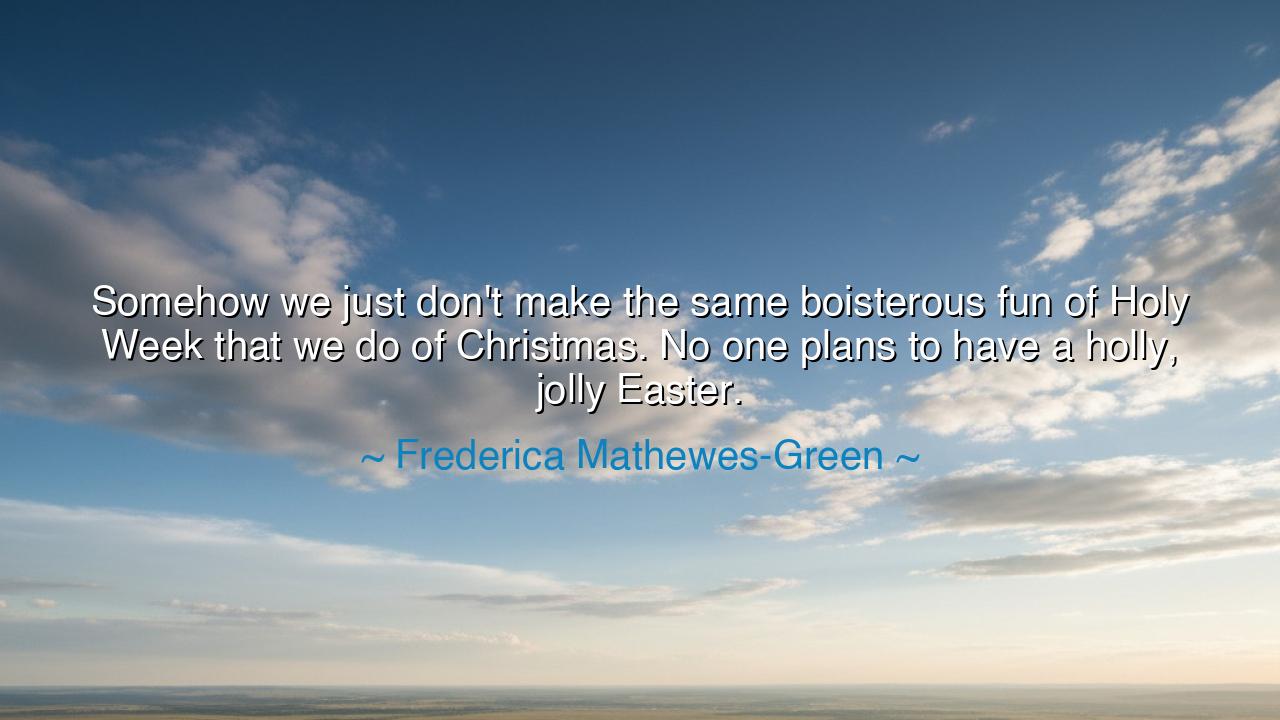
Somehow we just don't make the same boisterous fun of Holy Week
Somehow we just don't make the same boisterous fun of Holy Week that we do of Christmas. No one plans to have a holly, jolly Easter.






Host: The room was quiet, the soft glow of evening light filling the space with a gentle warmth. Outside, the world continued with its usual rhythm, but inside, there was a different kind of calm. Jack sat by the window, his thoughts clearly drifting between the moment and something deeper, while Jeeny sat nearby, her book resting in her lap, her gaze thoughtful.
Jeeny: (breaking the silence, her voice gentle but reflective) “You know, Frederica Mathewes-Green once said, ‘Somehow we just don’t make the same boisterous fun of Holy Week that we do of Christmas. No one plans to have a holly, jolly Easter.’”
(She looked at Jack, her voice warm but curious.) “What do you think she meant by that? About how we celebrate Easter differently than Christmas?”
Jack: (pausing, his voice thoughtful as he processed the words) “I think she’s pointing out the difference in how we approach the two holidays. Christmas is all about joy, celebration, light, and togetherness. It's boisterous, it’s loud, it’s filled with festivity. But Easter — Easter is more solemn, more reflective. It’s about sacrifice, renewal, and the quiet power of resurrection. There’s a reverence to it that doesn’t lend itself to the same kind of loud celebration.”
Jeeny: (nodding slowly, her voice steady) “Exactly. Easter is the culmination of the story of suffering and redemption, and that’s not something we can easily package into a commercialized celebration. While Christmas is about the birth of hope and joy, Easter represents the depth of what hope and joy cost. It’s not about being loud; it’s about reflection, gratitude, and the understanding that something profound happened.”
Jack: (leaning back, his voice softer now) “It’s true. And in a way, I think that makes Easter even more powerful. Christmas can be wrapped in gifts and decorations, but Easter demands a quiet reverence. It’s not something we can easily dress up or make light. It requires us to sit with it, to understand it in a more intimate, personal way.”
Jeeny: (smiling gently, her voice full of understanding) “Yes, and that’s why Easter has its own kind of beauty. It’s not about joy for joy’s sake. It’s about the joy that comes after deep struggle, after something broken has been made whole again. It’s a more subtle kind of celebration, but no less meaningful.”
Jack: (reflecting, his voice quieter now) “Maybe that’s what makes it so powerful. The quietness of it allows the depth of the meaning to settle in. It’s not about the boisterous fun; it’s about the transformation, the hope that comes after suffering. That’s what we’re celebrating.”
Jeeny: (smiling softly) “Exactly. And while we may not plan for a ‘holly, jolly Easter,’ the stillness of the holiday allows us to truly appreciate the miracle at its heart. It’s a different kind of celebration — one that’s felt deeply, even if it’s not loudly expressed.”
Host: The room seemed to grow even quieter, the weight of their conversation settling in, as if the truth of Mathewes-Green’s words had unlocked a deeper understanding. Christmas, with all its loud joy and decorations, was a celebration of birth and hope. Easter, however, was a quiet celebration of life, renewal, and the profound depth of what had been achieved.
Jack and Jeeny sat in that silence, understanding that while the world may not celebrate Easter with the same loudness, the holiday carried its own strength, its own beauty, hidden in the quiet reflection of the resurrection. It was not the boisterous celebration, but the deep, transformative joy that made Easter unlike any other holiday.






AAdministratorAdministrator
Welcome, honored guests. Please leave a comment, we will respond soon